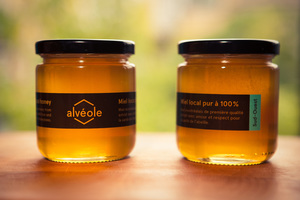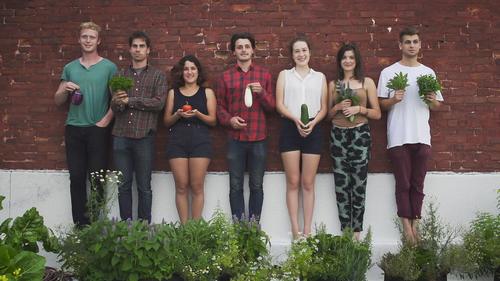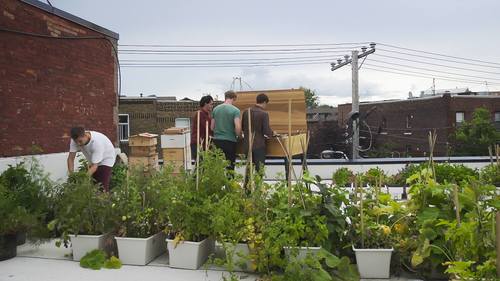Mid-November, I attended the two-year anniversary of an ingenious Montreal-based company called Alvéole. At its heart is the goal of reconnecting people to local food production. They install beehives on rooftops, maintain them and harvest honey in some of the most active neighbourhoods of the city, demonstrating with ease what it is like to initiate an innovative, sustainable enterprise whose process offers sweet returns.
In his hosting speech, co-founder Alexandre McLean shared interesting insights into benefits of beekeeping. Due to the pollinating assistance of these insects, an Alvéole client was able to obtain seven times more raspberries in her garden throughout the season. Seven times. Can it get more exciting than that? I spoke with Alexandre Ferrari, who is working with the founders on an important new addition to Alvéole's range of services: complete rooftop gardens. We talked about productive food systems, honey making and the various ways Alvéole plans to reconnect individuals to nature.
Q - You are a student in environmental science, focusing on food production. What pushed you to follow this path in your studies?
It happened quite effortlessly. I remember as a child loving having a direct connection to food, being able to pick an apple directly from a tree. I find we are disconnected from this relationship in urban settings. Having to go to the market for groceries creates a big divide in our perception of food. It creates distance between acknowledging how crucial it is to eat fresh, the importance of organic food, and to understand where it comes from. When came the time to decide what I wanted to study, I looked at the job opportunities in this field and realized that it made perfect sense to focus on the environment and food production. We need to acknowledge and safeguard this relation.
Q - How did you meet the creators of Alvéole and get involved in their project?
Alexandre McLean, Etienne Lapierre and Declan Rankin Jardin are Alvéole's co-founders. Their mission is to bring urban beekeeping to a whole new level, and by doing this, reconnect individuals to local food production. Quebec imports 75% of its honey from abroad. By installing hives on rooftops, they bridge the divide between honey production and the market. They create quality products that necessitate less transport. They understand that their initiative has an impact on many levels. They contacted me to know if I would like to collaborate with them on a new segment of their project involving the design and creation of green rooftops with experimental hives. I decided to start testing different types of boxes offered on the market, notably the smartpot, the earthbox and the biotop. The idea was simple: find a functional system for the cultivation of honey and plants, for individuals and enterprises alike.
Q - How did these trial rooftop gardens go?
They all did great, actually. Rooftops are often unused spaces to begin with, making location easy to define. I proceeded with our trial at the Alvéole headquarters in Verdun last summer. I tested 60 pods, an equal number of smartpots, earthboxes and biotops which all have their own specific qualities for specific types of plants. We used permaculture principles of companion planting, uniting 3 to 5 different varieties per pod. Certain plants grow better together. For example, Tomatoes, eggplants and basil make a great team. But what we are doing by making rooftop gardens is not only growing food. We are providing a habitat for the bees. They're not just honey-making machines, they need to have rest areas and access to water. They need nature. Surrounding their hive with flora is a great advantage for the welfare of the colony.
Q - According to you, what are the biggest issues linked to food production in our society?
The need for diversity is one. People do not acknowledge how crucial it is. Monoculture fields have a strong impact on our environment. First of all, it depletes nutrients from the earth. The ground isn't balanced with the attributes of diverse plants that would bring different components of the earth.
And what if this monoculture consists of a plant that is not pollinated by bees? Colonies must go farther to pollinate. They can only go from 3 to 5 km radius from their hive. Monocultures affect their reach, which prevents them from pollinating a great variety of plants, and thus affects environmental diversity and the wellbeing of the colony. You see, it's not just about making honey, it's about the imbalances caused in our environment on a whole other scale.
Also, I believe we need to reduce our dependence on the fossil fuel industry. We are living in the post Green Revolution and we are seeing more and more the negative effects of the use of petrochemicals in our food production systems. The use of inorganic fertilizers, pesticides, fungicides and herbicides degrades our land and our health, disrupts the biota of our soils, leaches into our waterways, and is extremely input demanding. By reducing our dependence on fossil fuels to produce our food, not only do we produce healthier food, we reduce the actual cost of producing food. Since the existence of the planet, vegetation has been extremely productive. The biochemical and fossil fuel industries want us to think that without these new technologies we would not be able to feed the world. The truth is that our world is extremely rich and to underestimate the productivity of our world might cost us the ecosystems we depend on for survival.
There are many other problems in regards to our food production system. What we need are ingenious people willing to take a step back and find new solutions to problems that have been imposed upon us by large agro-chemical industries.
Q - And in urban areas, bees have enough diversity?
Actually, they do! Rooftop gardens are a major plus, but neighbourhood trees have a huge impact on a colony's production. Tonight, we are launching Alvéole's smartphone application, which can be used to highlight all sorts of aspects linked to urban beekeeping, such as honey composition.
Q - What does the Alvéole application do?
An interactive map of the city of Montreal is marked with all the locations of Alvéole hives. By clicking on each individual one, we can have access to a large quantity of information. The app accesses a database of the city in which the diversity of trees has been noted. That way, by calculating what trees are available in a 5km radius from the hive, we can know what plants contributed to the honey production of that specific hive. Different trees and plants produce different tasting honey. This means different neighbourhoods produce completely different tasting honey, and without even installing a hive it is possible to predict how the honey will turn out in different neighbourhoods.
 Last year we sent our honey to a lab to determine the composition of pollen in the honey. They found that in Westmount there was s high proportion of pollen from Melissa, which is a medicinal herb. It gave to the honey a mild taste of citrus. In other neighbourhoods like the Plateau, they found that there was a high proportion of raspberry pollen, which is known to give to the honey a very golden, almost reddish color. Although our application would not be able to distinguish these differences in honey since they do not come from trees, it would be interesting to have the ability to add all types of plants into the database in the future.
Last year we sent our honey to a lab to determine the composition of pollen in the honey. They found that in Westmount there was s high proportion of pollen from Melissa, which is a medicinal herb. It gave to the honey a mild taste of citrus. In other neighbourhoods like the Plateau, they found that there was a high proportion of raspberry pollen, which is known to give to the honey a very golden, almost reddish color. Although our application would not be able to distinguish these differences in honey since they do not come from trees, it would be interesting to have the ability to add all types of plants into the database in the future.
Q - If I have an adequate roof and would like Alvéole to use the space to produce honey, what should I do?
Not only a roof! We also install hives in gardens. Simply contact Alvéole through their website, it will be a pleasure for them to add you to the list. It's on a first come first serve basis. Certain neighbourhoods might reach their quota of hives quickly. We have to assure the bees won't be overcrowded and will have sufficient access to vegetation. That's another strongpoint of the Alvéole app, we get to keep track of which hives have access to what quantity of vegetation and prevent overcrowding. For example, McGill University has 20 hives, making us unable to install any in its vicinity, for fear of overcrowding that area.
Q - We know what winter looks like in Quebec. What happens to bees during the cold season? Do you remove the hives?
The hives stay at the same place all year long. During the fall, sweetened water is served to the bees, they stock it in their hive and feed on it during the winter months. When springtime arrives, they start emerging from the hive again.
Q - What are Alvéole's next plans? What are your next plans?
Next year we will be in good position to offer individuals and companies complete rooftop gardens, along with hives. Having properly tested the options last summer, we know what works best and will be offering this service to our clients. It will be possible for individuals to produce around 30% of their food all year round, as well as about 15 kg of honey. The production of fine herbs is especially easy to undergo and can become quite lucrative.
Alvéole teamed up with engineer Marc-André Roberge to produce a hive specifically for restaurants. This segment is referred to as Projet B. It contains beautifully designed partitions that can be detached and served directly to clients for them to enjoy locally produced honey, fresh out of the hive.
Alvéole is also in the works of expanding its reach to Montreal's suburbs and the greater Toronto area, where rooftop gardening is already very present. In Ontario, the government supports these initiatives more than in Montreal, they contribute 10$ for each square foot transformed. But Alvéole also has an impact outside of Canada. We teamed up with an NGO to instigate beekeeping initiatives in Haiti.
As for me, my way of tackling the problems linked to our food industry is by building/designing urban food production roof gardens in conjunction with urban beehives for people and businesses that want to be self-sufficient. Personally, I look forward to analyzing how the pollinating benefits of bees can maximize greenhouse food production. I plan on studying the matter while completing my degree and see to what extent bees can maximize our yield.
- Find Alvéole on Facebook, or contact them via their website.
© Photos courtesy of Samuel Trudelle-Gendron


Leave a comment